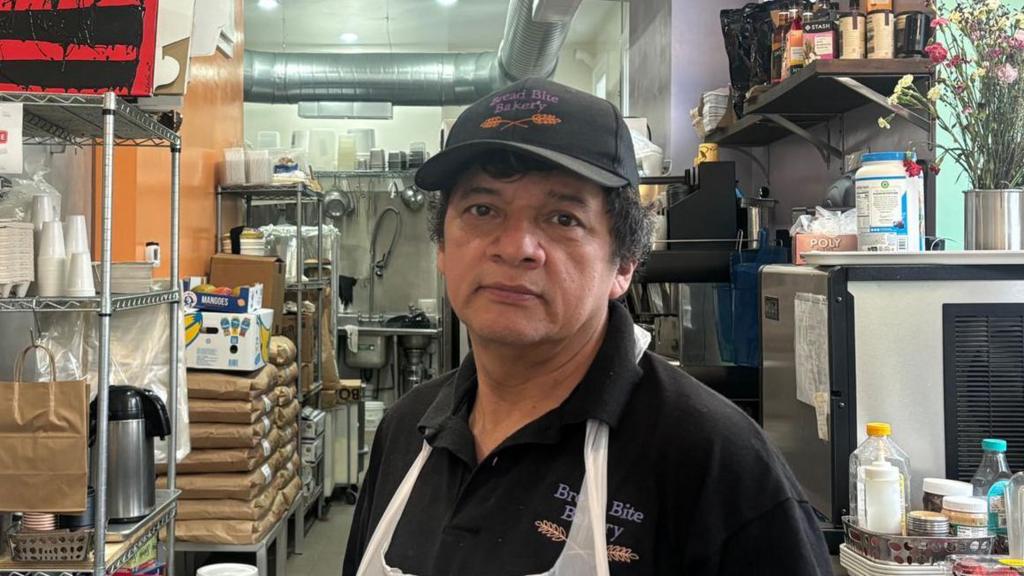The price for a cup of coffee in the US is going up as tariffs put the squeeze on local café and bakery owners.
Some US businesses say the queues for a morning latte are already getting shorter as customers tighten their belts and imported beans become more expensive.
Americans spend $100bn (£76bn) a year on coffee, though that might be about to change.
Jorge Prudencio, who runs Bread Bite Bakery in Washington DC, says his Colombia-based coffee distributer just increased prices after the sweeping tariffs went into effect last week.
The vast majority of coffee in the US is imported.
In fact, the US is the world’s second-leading importer of coffee, with the majority coming from Brazil and Colombia, according to the US Department of Agriculture.
Since 5 April, coffee imports have been affected by the 10% US tariffs against most countries.
Speaking to the BBC, Mr Prudencio said his coffee suppliers have told him his next order will carry yet another price hike.
He added that his bakery will “definitely” be increasing prices for customers just to break even.
Asked if he is worried, Mr Prudencio said: “Of course.”
The manager of Au Lait café just down the street, Kamal Mortada, said he’s been seeing the effect of steadily increasing prices for a while now. Inflation spiked to a 40-year high under former US President Joe Biden.
Before the tariffs kicked in, ground coffee reached the highest ever recorded price in March 2025, and was over a dollar more expensive than the previous year, and $3 above March 2020 prices.
“We have less customers for coffee,” Mr Mortada said.
“Most customers just get plain coffee,” instead of adding syrups and milks, he said.
The prices on the menu have gone up by 25% and people are now buying smaller coffees.
Mr Mortada has also changed his own habits as a consumer. Instead of his regular trip to Starbucks, he brews coffee at home.
He said he has seen the price of a cup of coffee go up by at least half a dollar, and is worried prices will rise again.
On the opposite coast in San Francisco, another local coffee shop owner is grappling with what the tariffs will mean for her business.
Jenny Ngo, who runs Telescope Coffee, said she was waiting to hear how much her roaster will hike prices.
The coffee she sells is sourced from Ethiopia and Guatemala, both facing the standard 10% tariff. She also imports her iced coffee cups from China – and said she noticed the prices on those jumped overnight.
“We unfortunately project to raise prices again in order to sustain our business,” she said.
Mr Prudencio remains confident that people will still come to his shop and buy coffee. He said it is something people need.
But recent inflation has also affected the price of eggs, crucial to his bakery side of the business.
He said they paid $42 per case when the bakery opened five months ago, but two weeks later it was more than $100 per case.
“Everybody is going through the same thing. We all pay the price.”
The price of eggs is a key symbol of the health of the US economy, often an arguing point for politicians.
President Donald Trump has argued he will get the cost of eggs down, blaming rising prices on the Biden administration, which culled millions of egg-laying chickens amid a bird flu outbreak.
But in March, egg prices reached a record high at $6.22 per dozen, according to the Consumer Price Index.
Joel Finkelstein runs Qualia Coffee Roasters, a small business in Washington DC where he mostly sells coffee beans online and at farmers’ markets.
The tariffs will represent just the latest in a series of price hikes, he told us.
He said he noticed the price of beans go up significantly after Trump took office and cut funding to USAID, which supported some coffee growers in South America. Now, he’s expecting it to go up again.
“We are going to see a decrease in sales,” Mr Finklestein said.
The US president has also called for the institution to lose a valuable tax break, saying it has not done enough to combat antisemitism on campus.
The judge vowed “no tolerance for gamesmanship” as she requests an update in the case of Kilmar Ábrego García.
Officials in the US and El Salvador have been unwilling to return the man home, sparking a legal battle.
Universities, as well as many charities and religious groups, are exempted from paying federal income taxes.
The former president broke with his practice of not criticising policies or leaders on social media to praise Harvard’s stand

